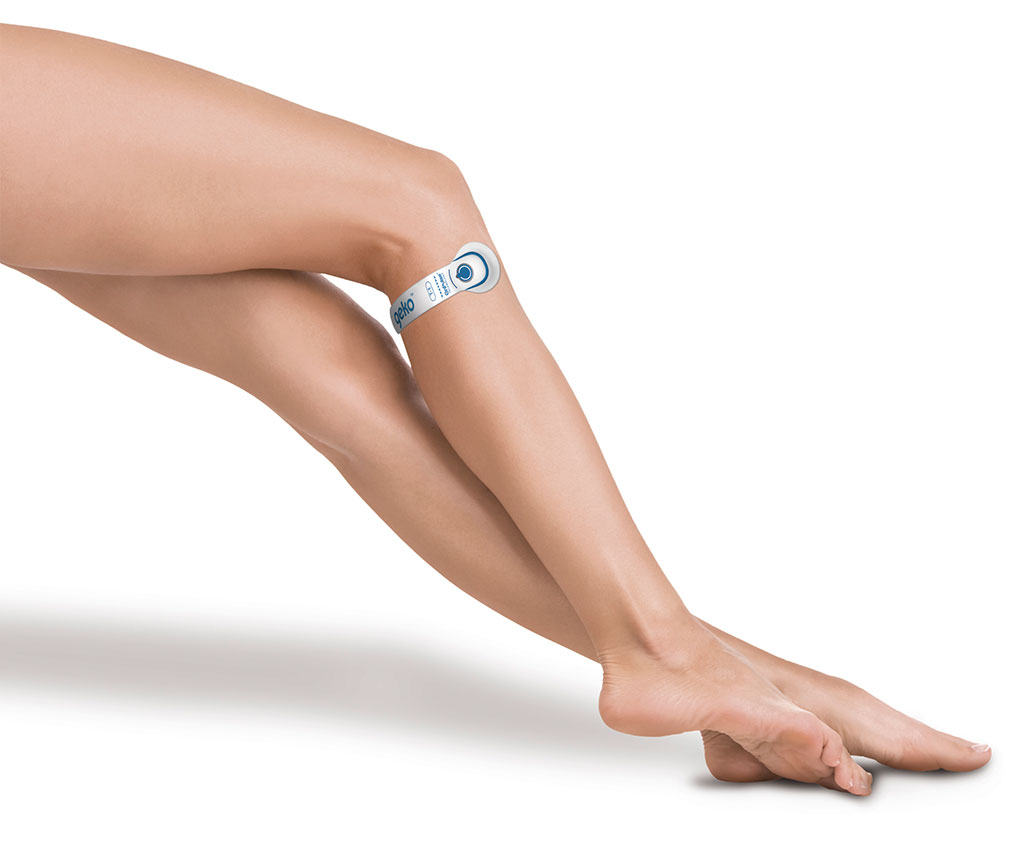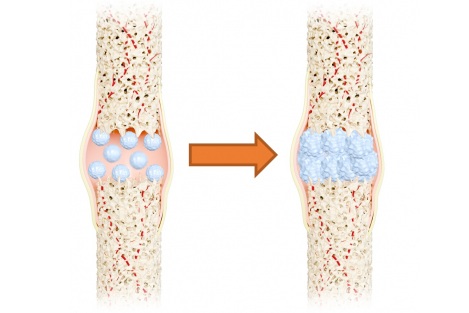Neuromuscular Stimulator Increases Microcirculatory Blood Flow
|
By HospiMedica International staff writers Posted on 28 Dec 2021 |

Image: The discrete geko device increases venous return in the legs (Photo courtesy of Sky Medical)
A wearable device increases microcirculatory blood flow in the lower limbs of patients with venous insufficiency and/or ischemia.
The Sky Medical Technology (High Wycombe, United Kingdom) geko device is a disposable wristwatch size device worn just under the knee that is designed to gently stimulate the common peroneal nerve. Due to its proximity to the posterior/anterior bifurcation, the common fibular nerve, and the external and lateral popliteal nerves, it’s stimulation results in activation of the tibialis, peroneus longus, and lateral gastrocnemius muscles. The simultaneous contraction of these muscles compresses and efficiently evacuates blood in the deep veins of the calf.
Once switched on, and the appropriate stimulation level selected, the patient is made aware of the muscle contractions, but with no change to either heart rate or blood pressure. During treatment, the uncomfortable sensation recedes after a few minutes thanks to accommodation, awareness of the muscle contractions lessens, and patients can carry on with their normal daily routine, including going to sleep. The geko device needs to be removed if the patient needs to a shower or bathe.
“Through our central strategy in partnering with healthcare professionals to solve challenging medical problems, we identify and translate clinical needs into cutting-edge products and evidence-based protocols,” said Bernard Ross, CEO of Sky Medical Technology. “The new standards of care simplify treatments for clinicians and improve patient outcomes, and new care pathways are in development in neurology, orthopedics, renal, and peripheral vascular disease.”
Venous insufficiency and ischemia relate to reduced blood flow in the veins and arteries, most often resulting from incompetent valves. Venous insufficiency can lead to lower extremity edema, skin changes, and discomfort, but if left untreated, can progress to chronic venous insufficiency (CVI), which can lead to post-phlebitic syndrome and venous leg ulcers.
Related Links:
Sky Medical Technology
The Sky Medical Technology (High Wycombe, United Kingdom) geko device is a disposable wristwatch size device worn just under the knee that is designed to gently stimulate the common peroneal nerve. Due to its proximity to the posterior/anterior bifurcation, the common fibular nerve, and the external and lateral popliteal nerves, it’s stimulation results in activation of the tibialis, peroneus longus, and lateral gastrocnemius muscles. The simultaneous contraction of these muscles compresses and efficiently evacuates blood in the deep veins of the calf.
Once switched on, and the appropriate stimulation level selected, the patient is made aware of the muscle contractions, but with no change to either heart rate or blood pressure. During treatment, the uncomfortable sensation recedes after a few minutes thanks to accommodation, awareness of the muscle contractions lessens, and patients can carry on with their normal daily routine, including going to sleep. The geko device needs to be removed if the patient needs to a shower or bathe.
“Through our central strategy in partnering with healthcare professionals to solve challenging medical problems, we identify and translate clinical needs into cutting-edge products and evidence-based protocols,” said Bernard Ross, CEO of Sky Medical Technology. “The new standards of care simplify treatments for clinicians and improve patient outcomes, and new care pathways are in development in neurology, orthopedics, renal, and peripheral vascular disease.”
Venous insufficiency and ischemia relate to reduced blood flow in the veins and arteries, most often resulting from incompetent valves. Venous insufficiency can lead to lower extremity edema, skin changes, and discomfort, but if left untreated, can progress to chronic venous insufficiency (CVI), which can lead to post-phlebitic syndrome and venous leg ulcers.
Related Links:
Sky Medical Technology
Latest Critical Care News
- Origami Robots to Deliver Medicine Less Invasively and More Effectively
- Improved Cough-Detection Technology Aids Health Monitoring
- AI Identifies Children in ER Likely to Develop Sepsis Within 48 Hours
- New Radiofrequency Therapy Slows Glioblastoma Growth
- Battery-Free Wireless Multi-Sensing Platform Revolutionizes Pressure Injury Detection
- Multimodal AI to Revolutionize Cardiovascular Disease Diagnosis and Treatment
- AI System Reveals Hidden Diagnostic Patterns in Electronic Health Records
- Highly Sensitive On-Skin Sensing Monitor Detects Vitamin B6 and Glucose in Sweat
- Artificial Intelligence Revolutionizing Pediatric Anesthesia Management
- New Device Detects Tuberculosis DNA Directly in Exhaled Air
- New Menstrual Cup Could Detect Infections and Improve Diagnostics
- Engineered “Natural Killer” Cells Could Help Fight Cancer
- Faster Lymph Flow Predicts Better Response to Diuretics in Acute Heart Failure
- New Global Recommendations Aim to End Deaths from Postpartum Hemorrhage
- 'Flat-Line ECG' Indicates Poor Outcomes for Out-Of-Hospital Cardiac Arrest
- New Guidance to Improve Diagnosis and Management of Heart Failure During Pregnancy and Postpartum
Channels
Surgical Techniques
view channel
Novel Glue Prevents Complications After Breast Cancer Surgery
Seroma and prolonged lymphorrhea are among the most common complications following axillary lymphadenectomy in breast cancer patients. These postoperative issues can delay recovery and postpone the start... Read more
Breakthrough Brain Implant Enables Safer and More Precise Drug Delivery
Delivering medication directly to specific regions of the brain has long been a major challenge in treating neurological disorders. Current implants and infusion systems typically reach only one or two... Read morePatient Care
view channel
Revolutionary Automatic IV-Line Flushing Device to Enhance Infusion Care
More than 80% of in-hospital patients receive intravenous (IV) therapy. Every dose of IV medicine delivered in a small volume (<250 mL) infusion bag should be followed by subsequent flushing to ensure... Read more
VR Training Tool Combats Contamination of Portable Medical Equipment
Healthcare-associated infections (HAIs) impact one in every 31 patients, cause nearly 100,000 deaths each year, and cost USD 28.4 billion in direct medical expenses. Notably, up to 75% of these infections... Read more
Portable Biosensor Platform to Reduce Hospital-Acquired Infections
Approximately 4 million patients in the European Union acquire healthcare-associated infections (HAIs) or nosocomial infections each year, with around 37,000 deaths directly resulting from these infections,... Read moreFirst-Of-Its-Kind Portable Germicidal Light Technology Disinfects High-Touch Clinical Surfaces in Seconds
Reducing healthcare-acquired infections (HAIs) remains a pressing issue within global healthcare systems. In the United States alone, 1.7 million patients contract HAIs annually, leading to approximately... Read moreHealth IT
view channel
Printable Molecule-Selective Nanoparticles Enable Mass Production of Wearable Biosensors
The future of medicine is likely to focus on the personalization of healthcare—understanding exactly what an individual requires and delivering the appropriate combination of nutrients, metabolites, and... Read moreBusiness
view channel
Philips and Masimo Partner to Advance Patient Monitoring Measurement Technologies
Royal Philips (Amsterdam, Netherlands) and Masimo (Irvine, California, USA) have renewed their multi-year strategic collaboration, combining Philips’ expertise in patient monitoring with Masimo’s noninvasive... Read more
B. Braun Acquires Digital Microsurgery Company True Digital Surgery
The high-end microsurgery market in neurosurgery, spine, and ENT is undergoing a significant transformation. Traditional analog microscopes are giving way to digital exoscopes, which provide improved visualization,... Read more
CMEF 2025 to Promote Holistic and High-Quality Development of Medical and Health Industry
The 92nd China International Medical Equipment Fair (CMEF 2025) Autumn Exhibition is scheduled to be held from September 26 to 29 at the China Import and Export Fair Complex (Canton Fair Complex) in Guangzhou.... Read more














